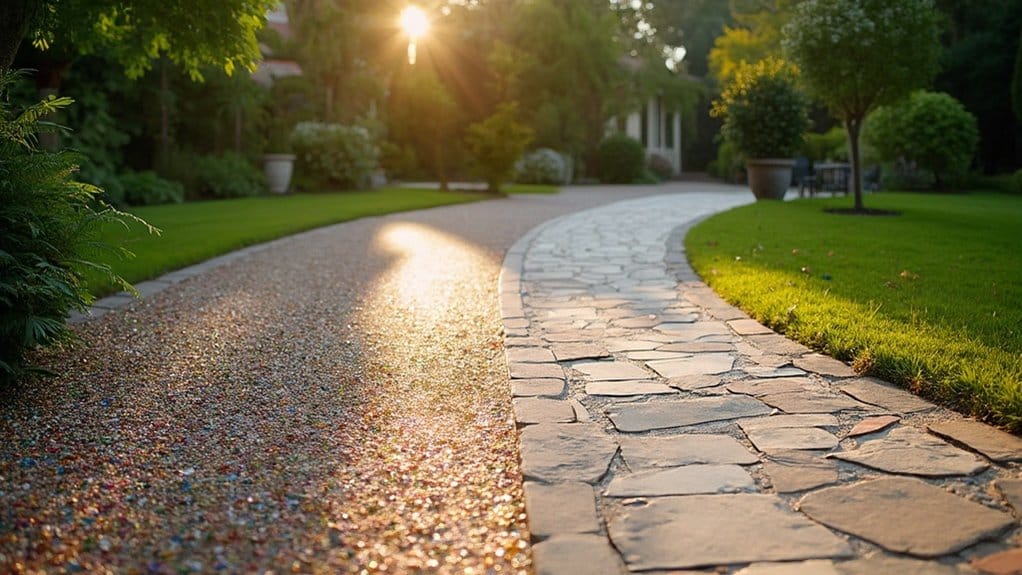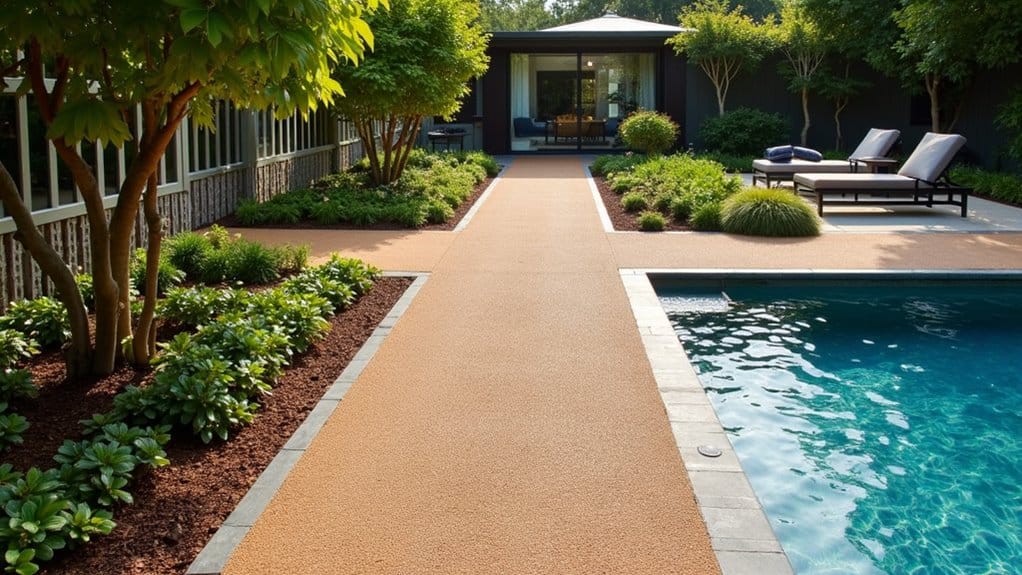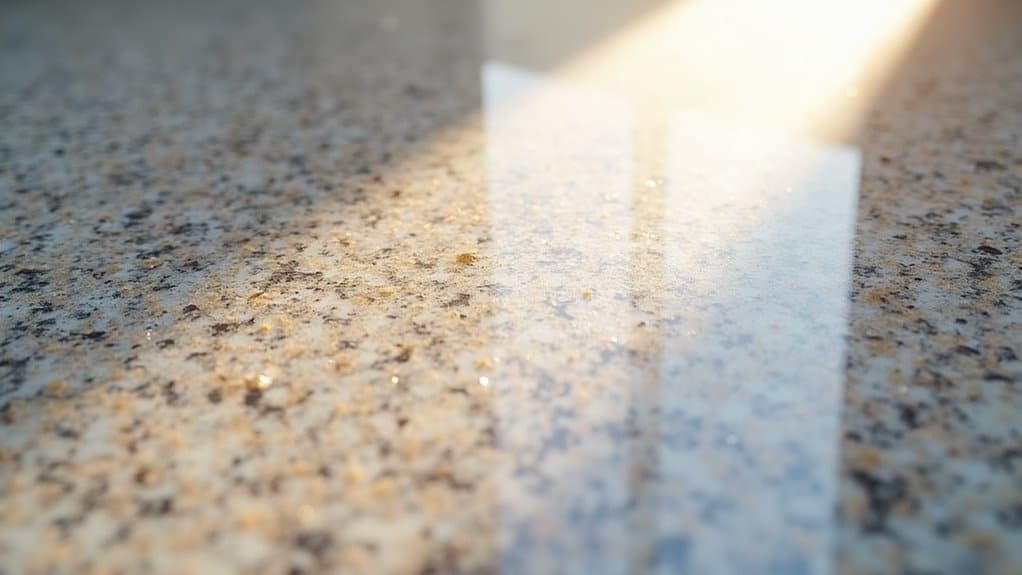Resin-bound driveways offer a smooth, durable surface that allows for effective water drainage, making them an eco-friendly choice. On the other hand, resin-bonded driveways have a textured finish that enhances existing surfaces but can require more maintenance due to loose stones. While resin-bound options provide greater customisation and longevity, resin-bonded alternatives offer decent slip resistance. Understanding these distinctions is crucial in selecting the right driveway for your property, helping you make an informed decision.
Table of Contents
ToggleKey Takeaways
- Resin-bound driveways offer a smooth, flexible surface that can be tailored to your taste, while resin-bonded driveways have a textured finish that mimics gravel for a rustic look.
- Installing a resin-bonded driveway is straightforward and can be laid directly onto existing surfaces, whereas resin-bound driveways require more extensive groundwork.
- Resin-bound driveways are built to last 20-25 years with little maintenance, while resin-bonded driveways may need more regular upkeep due to loose stones.
- The porous nature of resin-bound driveways allows for effective drainage, which helps prevent water pooling, whereas resin-bonded driveways can cause runoff issues.
- In terms of cost, resin-bound driveways are pricier, typically ranging from £11.57 to £16.08 per square foot, compared to £8.09 to £11.20 for resin-bonded driveways.
Definition and Characteristics of Resin-Bound Driveways
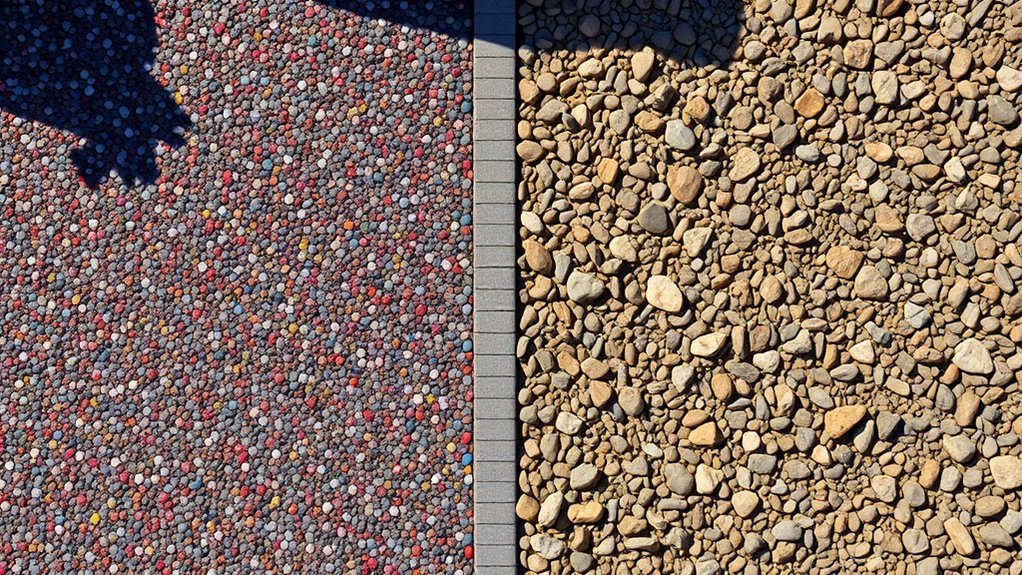
Resin-bound driveways offer a modern option for homeowners looking for a durable and attractive surface. They’re made by mixing natural aggregates, such as gravel or crushed stone, with a clear resin that binds them together. This mixture is applied over a solid base like tarmac or concrete and finished to a smooth thickness of 12-24mm. The resin’s binding properties ensure that each aggregate is coated, resulting in a robust surface that’s also porous, allowing water to drain through. This not only helps to prevent puddles but also reduces the risk of flooding. Additionally, proper surface preparation is crucial for maximizing the performance and longevity of the driveway. With a variety of colours and textures available, you can easily customise your driveway to match your home’s aesthetic. Furthermore, the permeable surface design of resin-bound driveways contributes to eco-friendliness by reducing flooding risk.
Definition and Characteristics of Resin-Bonded Driveways
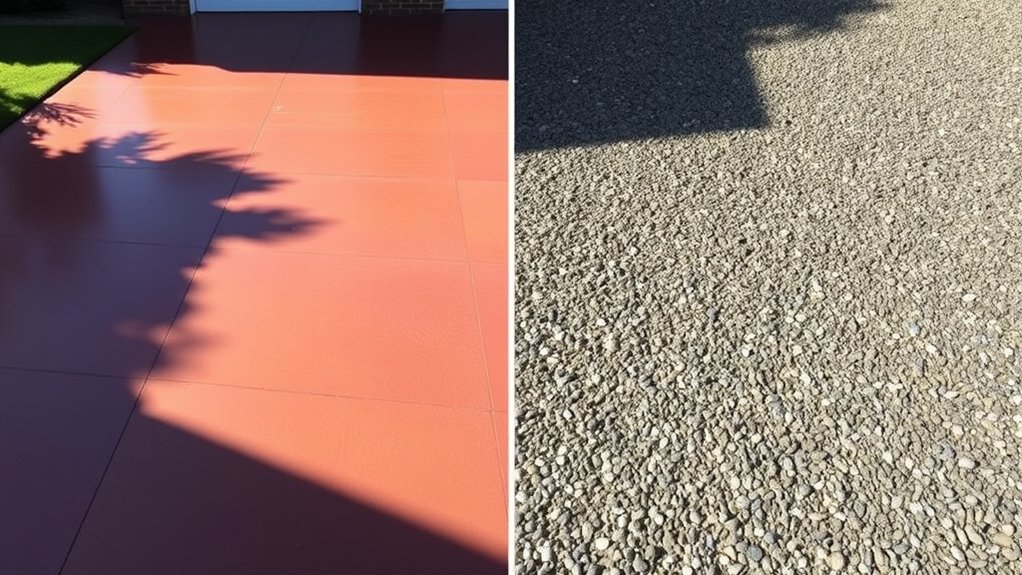
Resin-bonded driveways are made by applying a layer of resin over a solid base, such as concrete or tarmac, and then embedding aggregate stones on top. This results in a textured surface that resembles gravel but prevents the stones from shifting. Knowing how these driveways are constructed, how they feel underfoot, and what maintenance they require is key to ensuring they last and perform well. The process of polymerization during curing creates strong cross-links within the resin, enhancing durability and strength. Additionally, the surface characteristics of resin-bonded driveways provide good slip resistance, making them a practical choice for various environments.
Composition and Structure
When choosing a driveway, it’s important to understand how resin bonded systems work. A resin bonded driveway involves applying a binding resin over an existing surface and then covering it with aggregate stones, such as gravel or crushed stone. The resin seeps into the stones, creating a strong bond without the need for mixing beforehand.
Unlike other driveway systems, resin bonded driveways enhance existing surfaces while also improving their appearance and slip resistance. The materials used are durable and reduce movement underfoot, making them suitable for various bases like concrete or tarmac. This structure offers both strength and stability, providing a practical and visually appealing driveway solution. Additionally, resin bonded driveways may require additional drainage solutions to prevent pooling. The high grip surface created by the textured finish ensures excellent traction for both vehicles and foot traffic.
Surface Texture and Appearance
When choosing a driveway, resin bonded options offer a distinctive surface texture and appearance that sets them apart. These driveways feature a textured finish achieved by scattering aggregate over a resin layer, providing excellent slip resistance and a rustic charm that complements traditional homes. While they may not offer the same level of customisation as resin bound alternatives, their natural stone-like look ensures they remain visually appealing.
| Characteristic | Resin Bonded Driveways | Comparison to Resin Bound |
|---|---|---|
| Surface Durability | High, with fixed aggregate | Smoother but less textured |
| Aesthetic Appeal | Rustic, blends with nature | Modern, sleek appearance |
| Traction | Excellent slip resistance | Less grip |
| Environmental Fit | Ideal for historical settings | Suited to contemporary styles |
Installation and Maintenance Needs
The installation of resin-bonded driveways is simple, making them a popular choice for homeowners looking for an attractive and practical surface.
You can apply resin directly onto existing concrete or tarmac, which streamlines the process. After ensuring a clean base, just apply the resin and scatter loose aggregates over the top.
Maintenance is minimal, but to keep your driveway slip-resistant, regular cleaning to remove dirt and debris is important.
While resin-bonded surfaces are durable, they may need occasional repairs due to harsh weather conditions.
For the best results, it’s wise to consult professionals during installation.
Follow these tips to enjoy a long-lasting, textured driveway that enhances your home’s appeal.
Durability Comparison Between the Two Types
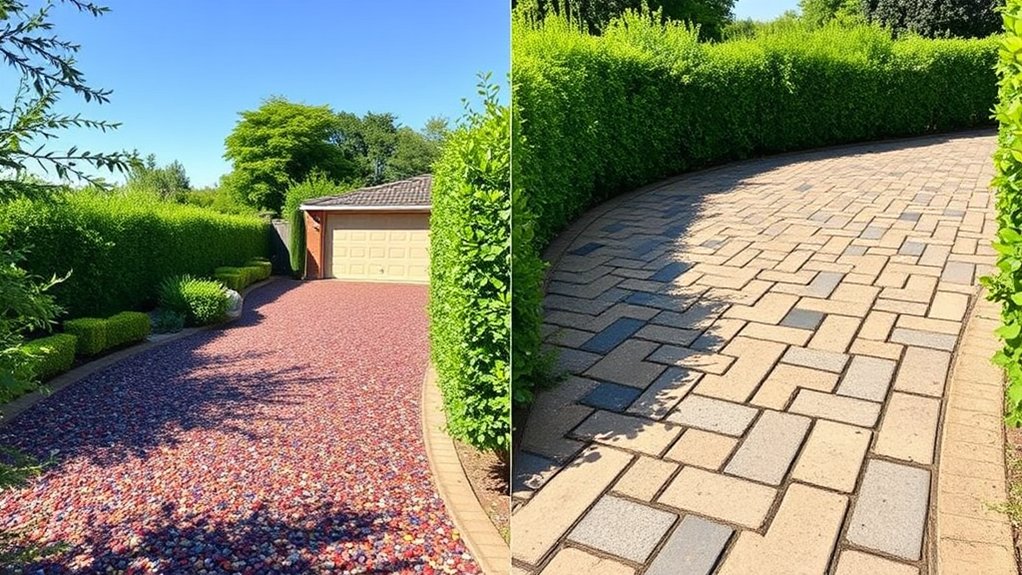
When considering driveway options, both resin-bound and resin-bonded surfaces have their merits, but they differ significantly in durability.
Resin-bound driveways are built to last, with a lifespan of 20 to 25 years and require minimal upkeep. Their flexible nature helps prevent cracking from temperature fluctuations, ensuring they remain structurally sound.
On the other hand, resin-bonded driveways tend to be less durable, often facing issues like loose stones and inadequate adhesion.
Key points to consider:
- Resin-bound surfaces are more resistant to cracking.
- They need less maintenance compared to resin-bonded options.
- Effective drainage can significantly enhance the durability of resin-bound systems.
- Resin-bound driveways are also environmentally friendly due to their permeability.
Choosing the right type of driveway is crucial for long-term performance and maintenance, making durability a key factor in your decision.
Installation Process: Resin-Bound vs. Resin-Bonded
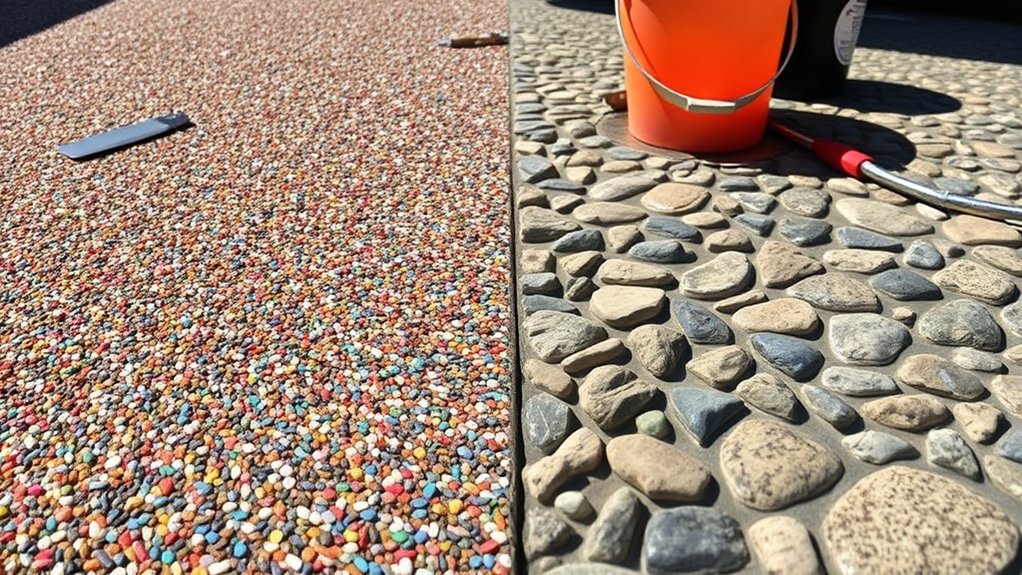
When looking at the installation process, there are notable differences between resin-bound and resin-bonded driveways.
For resin-bound, you need to mix the resin and aggregate thoroughly before applying it, whereas with resin-bonded, you apply the resin first and then scatter the aggregate on top.
This makes resin-bonded installations generally quicker, thanks to its more straightforward method.
Mixing and Laying
Understanding the mixing and laying processes for resin-bound and resin-bonded driveways is crucial for a durable and attractive finish.
– Mixing Techniques: For resin-bound driveways, resin and aggregates are mixed together to ensure an even coverage.
In contrast, resin-bonded driveways involve applying resin first, then scattering loose aggregates over it.
– Laying Methods: The application techniques differ significantly between the two systems.
It’s essential to follow the correct method for the desired outcome.
- Curing Time: Quick installation is vital since resin-bound mixes have a limited curing window.
- Equipment Requirements: You’ll need specific tools, such as paddle mixers, for resin-bound installations.
In both methods, proper base preparation and suitable weather conditions are key to ensuring longevity and optimal performance.
Installation Time Comparison
Installation time for resin-bound and resin-bonded driveways varies due to their different processes.
Resin-bound systems usually require more preparation, which can slow down installation. While both types can typically be finished in a day or two, resin-bound installations may take longer because they need specialised labour and extra groundwork for drainage.
Foot traffic can use resin-bound driveways after about 8 hours, but vehicles must wait 48 hours, affecting when you can use the driveway.
On the other hand, resin-bonded surfaces are generally quicker to install, but their lack of encapsulation might lead to more frequent maintenance, which could impact long-term efficiency.
Environmental Impact of Each Type
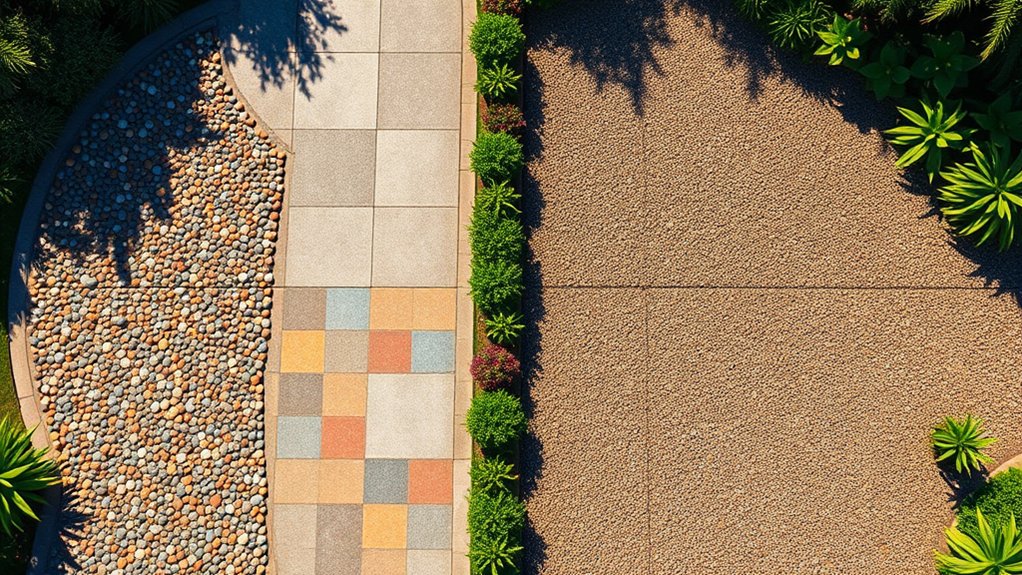
When comparing resin-bound and resin-bonded driveways, their environmental impacts are quite different.
- Resin-bound driveways are permeable, which helps reduce flooding and promotes sustainable practices.
- They often use recycled materials, boosting their ecological benefits and minimising waste.
- Both types contain non-biodegradable components, which can hinder overall sustainability.
- Resin-bound designs help protect local ecosystems and support biodiversity.
The permeability of resin-bound driveways allows water to drain naturally, meeting the criteria for Sustainable Urban Drainage Systems (SUDS).
This feature not only reduces flooding but also helps regulate soil temperatures, benefiting local plants and wildlife.
In contrast, resin-bonded driveways lack this permeability, which can cause water runoff and add stress to the environment.
Therefore, opting for a resin-bound driveway is a more eco-friendly choice.
Maintenance Requirements for Resin-Bound and Resin-Bonded Driveways
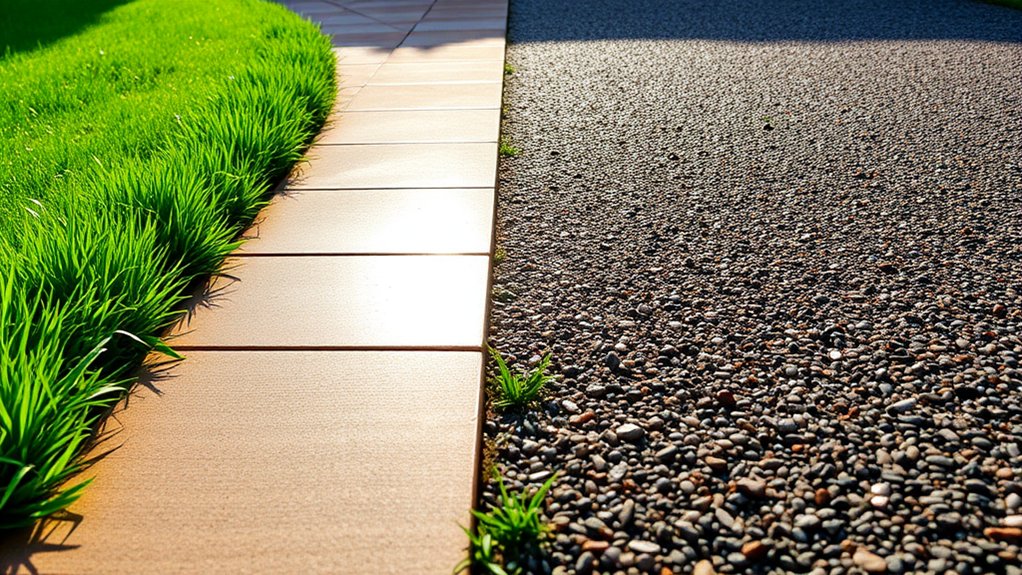
When maintaining your driveway, it’s important to consider the specific cleaning methods for resin-bound and resin-bonded surfaces. Each type has unique needs that affect its longevity and appearance. Understanding these techniques helps you keep your driveway in good condition and reduces wear over time.
For resin-bound driveways, a simple wash with warm soapy water and a stiff broom is usually sufficient. Avoid using pressure washers, as they can damage the surface. Regularly sweeping away leaves and debris also prevents moss and algae growth.
On the other hand, resin-bonded driveways may require a bit more attention. Use a mild detergent and a brush to clean them, and be cautious not to use harsh chemicals that could harm the resin.
Cleaning Techniques Overview
Cleaning and maintaining your driveway is vital for both resin-bound and resin-bonded surfaces to ensure they last and look good.
Here are some straightforward cleaning techniques and maintenance tips:
- Regularly brush and sweep to clear away debris and stop weeds from growing.
- Use a low-pressure jet wash to clean the surface without harming the resin.
- Avoid cleaning in direct sunlight, as this can cause cleaning solutions to dry too quickly.
- Apply a resin sealant every 5-10 years to protect against UV damage.
Long-Term Durability Comparison
Maintaining your driveway goes beyond just keeping it tidy; it’s essential to understand the long-term durability and maintenance needs of resin-bound versus resin-bonded driveways. When it comes to longevity, resin-bound driveways have the edge, particularly under heavy usage. Here’s a quick comparison:
| Driveway Type | Maintenance Requirements |
|---|---|
| Resin-Bound | Minimal; easy to clean, less wear |
| Resin-Bonded | Periodic stone replacement; prone to moss |
Both types require little upkeep, but resin-bound surfaces are more resistant to wear and environmental growth. Regular checks can help extend the life of either option, but resin-bound driveways generally provide better durability over time, making them a smart choice for areas with heavy foot or vehicle traffic.
Cost Factors: Installation and Material Expenses
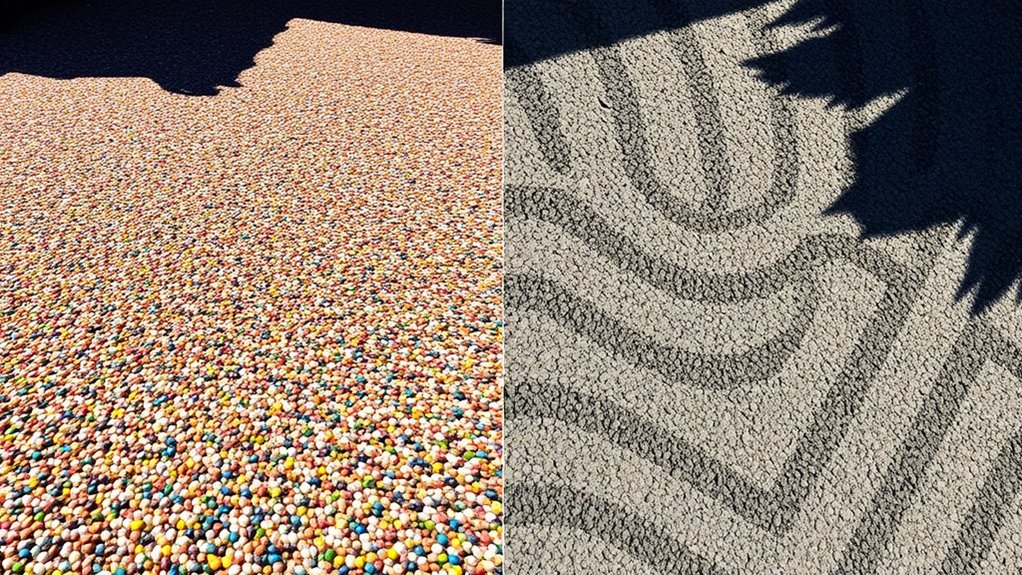
Understanding the cost factors for installing resin driveways is crucial for homeowners in the UK. Here’s what you need to consider for a cost-effective decision:
- Installation costs for resin bonded driveways typically range from £8.09 to £11.20 per square foot.
- For resin-bound driveways, expect costs between £11.57 and £16.08 per square foot.
- Material prices differ; resin bonded averages around £5.47 per square foot, while resin-bound is usually pricier due to its higher quality.
- Don’t forget additional expenses such as excavation and permits, which can increase the overall project cost.
Long-Term Value of Resin-Bound Driveways
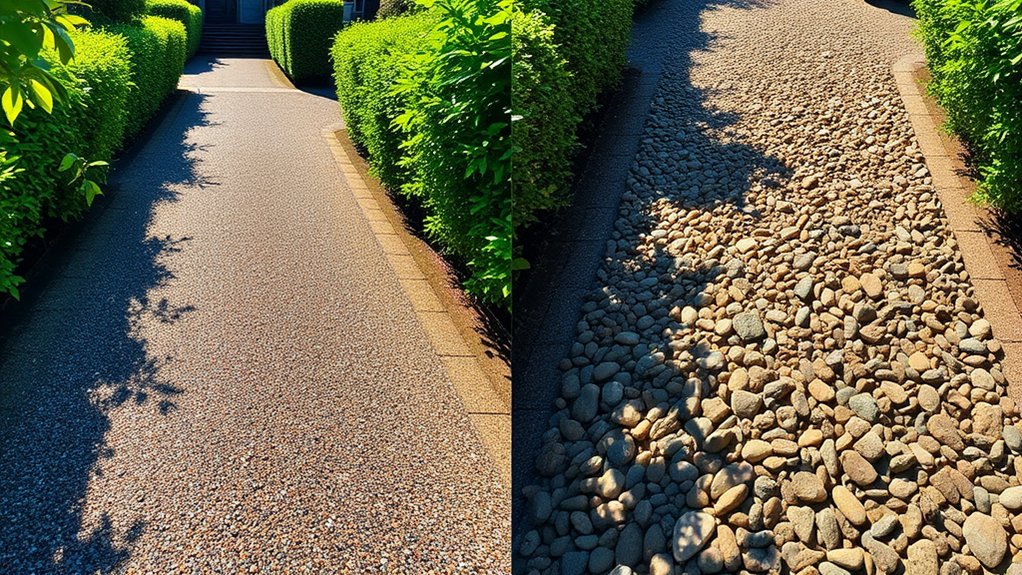
When assessing the long-term value of resin-bound driveways, their durability and resilience make them a smart choice for homeowners.
These driveways can last 20-25 years, significantly lowering maintenance costs. Their resistance to cracking, chipping, and oil stains means fewer repairs, which enhances your investment.
Plus, the eco-friendly nature of resin-bound driveways not only boosts your property’s appeal but also attracts environmentally conscious buyers, potentially increasing its market value.
The non-slip surface adds safety for families, and the range of designs enhances curb appeal.
Aesthetic Preferences: Smooth vs. Textured Surfaces
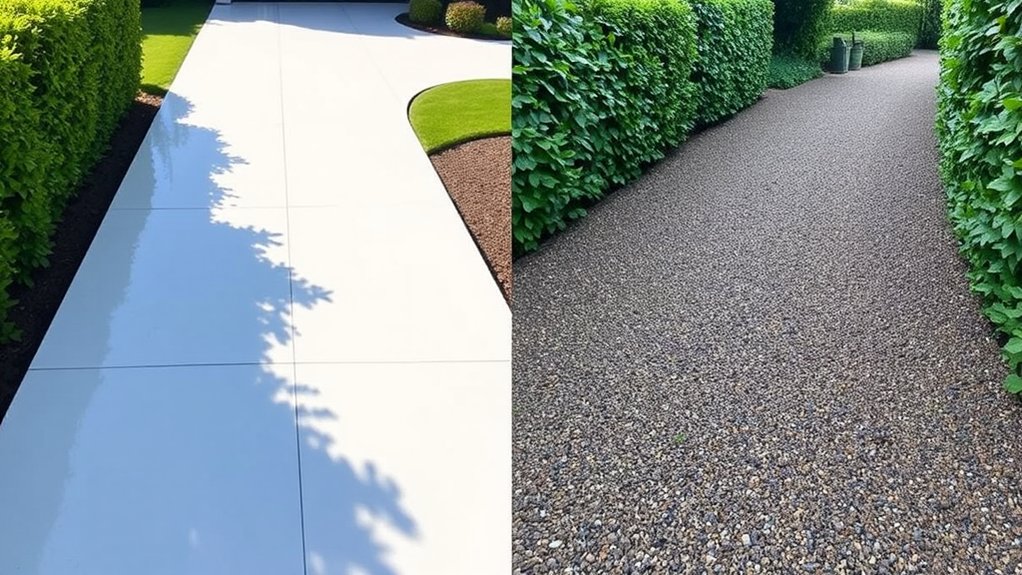
How do your aesthetic preferences affect your choice between smooth and textured surfaces for driveways? Consider how each type complements the style of your property.
- Smooth aesthetics of resin-bound driveways present a sleek, modern appearance.
- Textured finishes of resin-bonded driveways resemble loose gravel, making them suitable for rustic or traditional homes.
Smooth surfaces are more comfortable for pedestrians and wheelchair users.
Textured options offer better grip, especially on sloped areas.
Your choice should reflect your home or business’s character. If you prefer contemporary designs, a resin-bound surface may be the right fit.
Alternatively, if a classic look is your aim, a resin-bonded driveway could be more appropriate.
Understanding these differences will help you make a well-informed decision.
Color Options and Customization Possibilities
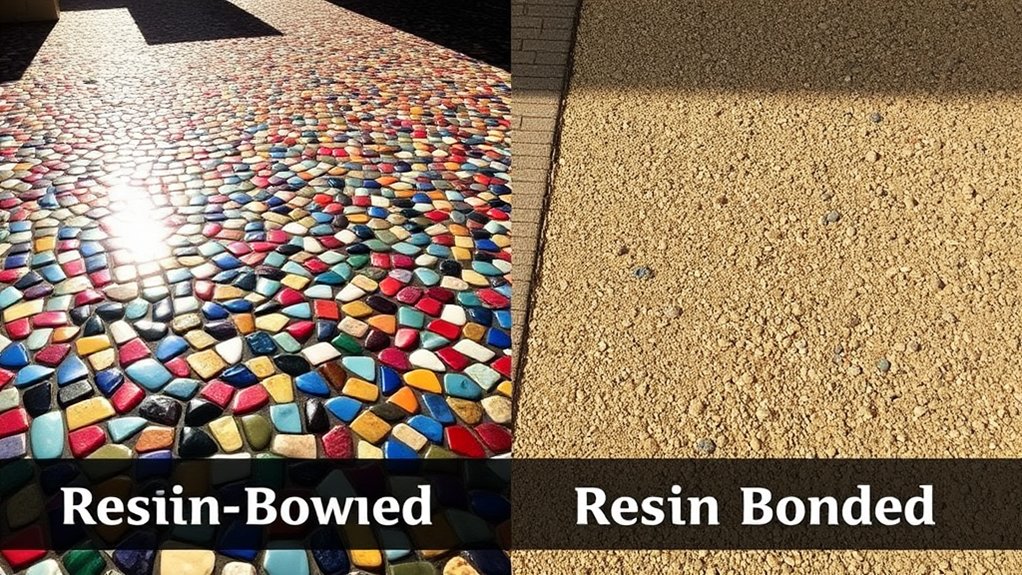
When selecting a driveway, aesthetics are key, but the colour options and customisation available for resin-bound and resin-bonded driveways can significantly enhance your property’s appeal.
You can choose from a wide range of colours, including popular choices like Silver Beach and Anthracite. Custom blends and geometric patterns allow for unique designs, while layering colours such as gold and brown provides a personalised touch.
Adding natural aggregates can mimic stone finishes, combining modern aesthetics with a classic feel. Darker shades offer a sophisticated look, while brighter colours can brighten the space.
These design options not only improve your driveway’s appearance but also ensure it matches your property’s style effectively.
Choosing the Right Driveway for Your Needs
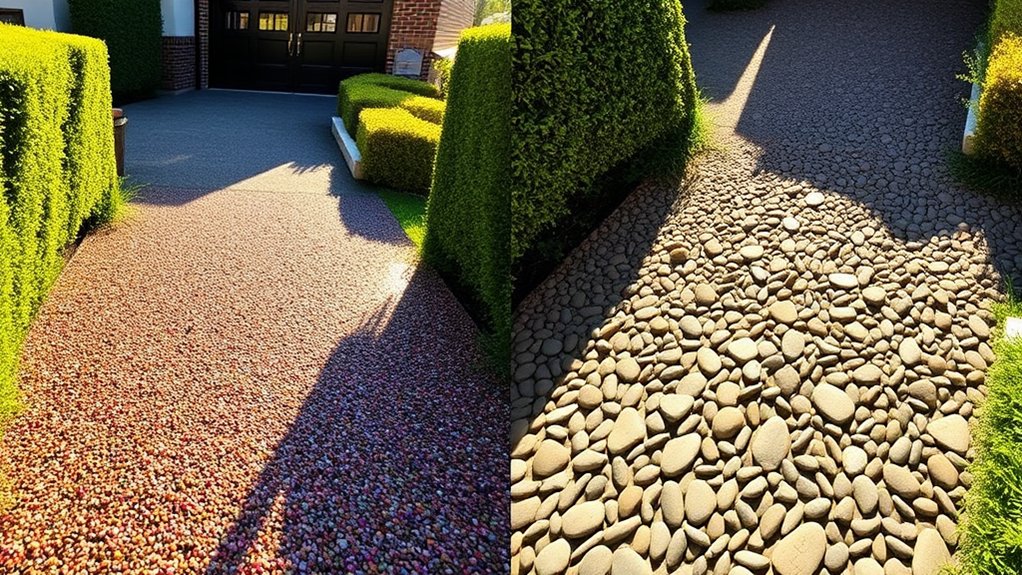
Choosing the right driveway goes beyond looks; it’s about installation, durability, and practicality. Here are some essential factors to consider:
- Driveway materials: Opt for resin-bound for a sleek, modern finish, or resin-bonded for a classic feel.
- Installation methods: Resin-bound requires a skilled tradesperson, whereas resin-bonded is quicker and simpler to lay.
- Durability: Resin-bound driveways generally last longer and are less prone to cracking than resin-bonded alternatives.
- Environmental impact: Resin-bound options are permeable, helping with drainage and minimising urban runoff.
Make sure to weigh these factors carefully to find the best fit for your needs.
Frequently Asked Questions
How Do Temperature Fluctuations Affect Resin-Bound and Resin-Bonded Driveways?
Temperature changes throughout the seasons affect driveways in different ways. Resin-bound driveways are designed to flex with temperature shifts, which helps reduce the risk of cracking. In contrast, resin-bonded surfaces have a non-porous structure that can cause water to pool, potentially leading to weakening during temperature fluctuations.
Can Resin Driveways Be Repaired if Damaged?
Regular maintenance of resin driveways can cut repair costs by as much as 50%. Simple repair methods, such as sealing cracks and reattaching loose stones, can help restore your driveway’s integrity effectively.
What Is the Lifespan of Resin-Bound and Resin-Bonded Driveways?
Resin-bound driveways generally last between 15 to 25 years, thanks to their robust resin and lower maintenance needs. On the other hand, resin-bonded driveways tend to have a shorter lifespan and require more regular upkeep to prevent surface wear. For instance, if you’re considering a durable option, resin-bound is the way to go.
Are There Any Color Fading Concerns With Resin Driveways?
Imagine bright colours gradually losing their vibrancy under the harsh sun. It’s essential to consider colour stability and UV resistance when choosing resin driveways. Poor installation or low-quality materials can lead to accelerated fading. To maintain that initial appeal, regular upkeep is key.
How Do I Choose the Right Contractor for Installation?
To select the right contractor for your installation, start by checking their qualifications and previous work. Ensure they hold relevant certifications, are well-established locally, and have positive customer reviews. For instance, a contractor with a strong track record in resin driveway installations will likely provide a more reliable service.
Conclusion
In summary, knowing the differences between resin-bound and resin-bonded driveways can help you make a better choice. Resin-bound driveways provide a smooth, modern finish similar to polished marble, while resin-bonded driveways offer a textured surface with a classic appeal. Think about factors such as durability, installation, and appearance to determine what suits your needs best. Choosing the right driveway can boost your property’s value—like moving from horse-drawn carriages to modern cars.
Prepare the perfect base for your resin bound stone installation and discover the crucial factors that ensure lasting durability.
Know where resin bound surfacing can transform spaces for both residential and commercial use, and discover the countless benefits that Read more
A stone carpet combines beauty and resilience in flooring, but what makes quartz floors uniquely beneficial? Discover the secrets behind Read more

